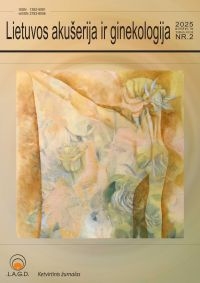THE VIEWS OF PREGNANT WOMEN TOWARDS THE USE OF ARTIFICIAL INTELLIGENCE IN THE EVALUATION OF CARDIOTOCOGRAM DURING LABOR
Abstract
Aim. To assess pregnant women’s views towards using artificial intelligence (AI) in the evaluation of cardiotocogram (CTG) during labor. Materials and methods. An anonymous questionnaire originally created by the authors, which consisted of 21 questions, was used. The study was conducted on the website www.apklausa.lt, QR codes with an active link to the survey website were created, and printed paper versions of the questionnaire were distributed in the Department of Obstetrics and Gynecology of Kauno klinikos. Results. 358 women participated in the study. Women with higher education and younger pregnant women were statistically significantly more likely to know what AI is and its potential applications in medicine. More than half of the respondents (64,8%, n=232) did not agree that AI would take over doctors’ jobs in the future or that doctors would become dependent on computer systems, which would result in a decline in the quality of care. The majority of surveyed women (78.2%, n=280) agreed to have their CTG evaluated by a physician during labor using AI. A significant level of trust in doctors was observed among the respondents – 88.3% (n = 316) of those surveyed stated that when AI is used to assess CTG data during childbirth, the final decision should be confirmed by a doctor. Conclusions. Younger women and those with higher education are better informed about AI and its potential applications in medicine. Respondents agree that AI is making progress in medicine and that its use in evaluating CTG during labor can make the doctor’s daily work easier. However, they do not believe that AI will take over doctors’ roles in the future. Most pregnant women would agree to have their CTG evaluated by a physician using AI during labor. Similar results were found in other studies – respondents agree that AI is a valuable decision support tool, but the final decision should be made by the doctor.

